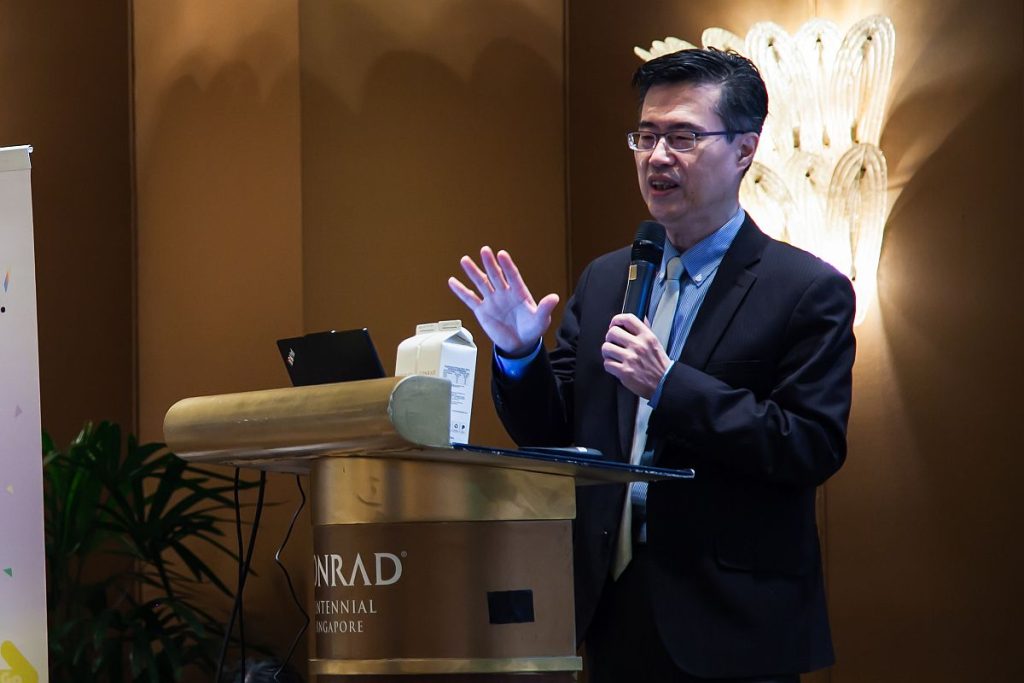SINGAPORE, Dec 18 – Governments around the world are underplaying the threats posed by Covid-19 and disregarding the potential long-term consequences on health, experts say.
Mount Elizabeth Novena Hospital Singapore infectious disease specialist Dr Leong Hoe Nam said studies have shown that Covid affects not only the respiratory system, but also has the chance of attacking the heart and increasing the risk of diabetes.
“There is a lot of downplaying because if you were to talk about it (Covid), people would rubbish it, and it’s not good for politicians to be rubbish. Instead they want to talk about making money, they want to talk about opening up the economy, and every time when Covid is mentioned, it talks about shutting down the economy – so bad news, bad associations.
“But we haven’t seen what is underneath the iceberg,” Dr Leong said at a media roundtable on the sidelines of the 27th Congress of the Asian Pacific Society of Respirology (APSR 2023) held here last November 17.
“The upper respiratory tract infections which we see this is just the beginning. What happens later, mark my words, five to 10 years later, look at the diabetes incidence. Every country’s diabetes incidence will go up and it is not because the food is better.”
Dr Leong highlighted that long Covid remains a pressing concern for the medical community, with the disease causing individuals to experience challenges in their ability to work or perform daily tasks as they did before.
“And of course, there is also long Covid, that’s my beef with the virus. Go and read up what long Covid is and watch the videos. It is heartbreaking. I look after children with long Covid. The parents will come to me and cry, ‘What can I do? They can’t go to school.’ I said, ‘Well, there’s nothing I can do.’
“What we really, really need to do is actually to raise awareness, vaccinate, so as to even prevent the illness, and when the illness comes in, protect your people.
“Singapore, of all the nations, knows that the people are the greatest resource. So what if you have the natural resources, but you don’t have the people to work on them? We’re going to lose a lot of healthy people,” Dr Leong said.
Malaysia’s Ministry of Health (MOH) has yet to issue an updated Covid-19 vaccine advisory for 2024 or to announce whether it would procure monovalent XBB.1.5 vaccines, or to allow product registration of the vaccine to enable people to pay for it in private clinics.
Health Minister Dzulkefly Ahmad told reporters last Thursday that the MOH would issue an advisory on Covid-19 booster vaccination in the coming weeks, but did not state if the government would procure the updated monovalent XBB.1.5 vaccine, saying instead that the country’s existing stocks still offered adequate protection.
The mRNA monovalent XBB.1.5 vaccines by Pfizer and Moderna – which also work against the EG.5 and BA.2.86 strains – have been approved by both the United States’ Food and Drug Administration (FDA) and Singapore’s health regulators for 2023/ 2024.
The World Health Organization (WHO) has recommended monovalent XBB.1.5 Covid-19 vaccines across different platforms against circulating variants.
Health director-general Dr Muhammad Radzi Abu Hassan said in a statement last Wednesday that the circulating Omicron variants in Malaysia are XBB.1.16, XBB.1.5, and EG.5.
Covid-19 cases in Malaysia jumped by 88 per cent to 12,757 cases in the 49th epidemiological week (December 3 to 9) from 6,796 cases the previous week.
Hospital admissions for confirmed and suspected Covid-19 cases, as well as the use of intensive care unit (ICU) beds, increased by 1.4 per cent in that period, while the percentage of Covid-19 patients needing breathing assistance machines rose by 0.5 per cent.
Get Antiviral Medication If Infected With Covid

Prof Dr Yang Kuang-Yao from the Institute of Emergency and Critical Care Medicine at the National Yang Ming Chiao Tung University in Taipei, Taiwan, said many people are feeling the effects of Covid-19 pandemic fatigue.
The World Health Organization (WHO) described “pandemic fatigue” as people feeling demotivated about following recommended behaviours to protect themselves and others from the virus.
“It’s because of the Covid pandemic fatigue, nobody wants to hear about Covid anymore. But if you are at high risk, you have to be alert. If you get infected, you should know where and how to get the antiviral treatment,” Dr Yang said.
The Covid oral antiviral pills are taken to help keep high-risk patients from developing severe illness. It is only used to treat Covid adult patients in Category Two and Three who do not require oxygen therapy but have medical conditions, such as cancer and diabetes, that qualify them as high risk.
As with all antivirals, Covid oral antivirals work best early in the course of an illness. Patients eligible for the treatment are required to take antiviral treatment within five days of developing symptoms. A full course constitutes three antiviral pills twice a day for five days.
Malaysia’s Drug Control Authority (DCA) has approved at least six pharmaceutical products for Covid-19 treatment as of March 2022.
They include the Ronapreve solution for injection or infusion manufactured by F. Hoffman-La Roche Ltd in Switzerland, Fabiflu 200mg tablets (Glenmark Pharmaceuticals Limited, India), Olumiant 2mg film-coated tablets (Lilly Del Caribe Inc, Puerto Rico), and Olumiant 4mg film-coated tablets (Lilly Del Caribe Inc, Puerto Rico).
The Paxlovid 150mg film-coated tablets and Ritonavir 100mg film-coated tablets (Pfizer Manufacturing Deutschland GmbH, Germany) and the Paxlovid 150mg film-coated tablets and Ritonavir 100mg film-coated tablets (Pfizer Ireland Pharmaceuticals, Ireland) were given conditional approvals earlier.
Pfizer’s Covid-19 treatment pill Paxlovid is available for free in public hospitals and klinik kesihatan, as well as private hospitals in Malaysia. A trial conducted by Pfizer in 2021 showed that Paxlovid can cut the risk of Covid-19 hospitalisation and death by 89 per cent.
Finding Covid-19 Origin Key In Fighting Virus

Dr Leong said it is important to identify the original source of Covid-19 as it could potentially prevent the next episode.
“When you know the source, how it happened, how it was introduced – be it a lab accident, or be it from a seafood market centre – if we know it, we can deal with it,” Dr Leong said.
“If you are old enough, before the 2000s, there were a lot of bird flu attacks and it was all coming out of Hong Kong. Hong Kong scientists are really one of the best in the world.
“They realised that the poultry market was the source of it, they realised it and did research, and all they had to do was to clear the market once a week and all the viruses that were propagating there and mutating there would be washed out.
“So you know the source, science answers the question on how to deal with it, and then you prevent it. After that, Hong Kong did not have any more bird flu incidences. That is why it is important to find the source. If we know the source, we could figure out how it happened, and then thereafter, prevent new ones,” Dr Leong added.
“The next Covid-19 could be in your own backyard.”
Dr Yang said it is very likely that new pandemics will arise as bacteria and viruses continue to live, transmit, and mutate everywhere in the world.
“I believe there will be a new pandemic in the future, definitely, because we know that the bacteria or virus is living [among us]. So I believe there will be more and more infectious diseases in the future.
“The best way to tackle any infectious disease is to first find the focus, then to isolate and prevent it from spreading out,” Dr Yang said.
“I believe that many people in public health are now keeping an eye or are alert about human infection. If there is a new infection somewhere, the researcher, or public health scientist will try and isolate them so they will be prepared in the future, maybe.”
However, Dr Yang is optimistic that scientists will continue to develop an “effective weapon” like vaccines to fight future pandemics. “For me, I am confident of our scientists that if we can deal with Covid-19, we can overcome future infections as well.”








